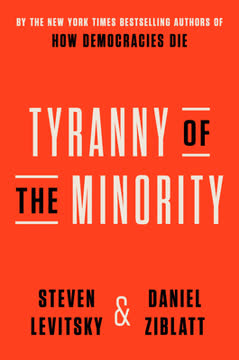重点摘要
1. 特朗普展现了邪教领袖的特质,利用说服技巧维持控制
“特朗普今天能走到这一步,很大程度上是因为他利用了同样的策略。”
邪教领袖的相似之处: 特朗普表现出邪教领袖常见的特征,包括自大、要求绝对忠诚,以及通过恐惧和混乱来操纵追随者。他的行为与文鲜明、L. Ron Hubbard和吉姆·琼斯等人物相似。
说服技巧: 特朗普使用了各种影响策略:
- 夸张的语言和重复
- 通过恐惧和伟大承诺进行情感操控
- 我们对他们的心态
- 煽动和否认事实
这些方法创造了一个忠诚的追随者群体,往往无视矛盾的证据或道德问题。
2. BITE模型解释了邪教如何控制行为、信息、思想和情感
“思想控制不是一个模糊的、神秘的过程,而是一套具体的、特定的方法和技巧。”
BITE模型的组成部分:
- 行为控制:调节物理现实、财务和关系
- 信息控制:限制外部信息来源,推广宣传
- 思想控制:灌输非黑即白的思维,停止思考的技巧
- 情感控制:引发内疚、恐惧和恐惧症
应用于特朗普: 虽然不是传统的邪教,但特朗普的政府和支持者表现出许多BITE模型的特征。这包括通过媒体操纵控制叙事,推广我们对他们的心态,并引发对外人或批评者的恐惧。
3. 特朗普的童年和商业经历塑造了他的独裁倾向
“你是一个杀手……你是一个国王……你是一个杀手……你是一个国王。”
形成性经历: 特朗普在一个独裁父亲的抚养下长大,并接触到诺曼·文森特·皮尔的“积极思维”哲学,这些都影响了他的世界观。他的商业实践,包括与罗伊·科恩等人物的交往,进一步强化了他的侵略性和专横的态度。
关键影响:
- 弗雷德·特朗普的严格教养方式
- 诺曼·文森特·皮尔的繁荣福音
- 罗伊·科恩的无情法律策略
- 现实电视形象的培养
这些因素结合起来,造就了一个将世界视为赢家和输家,并优先考虑个人忠诚和“胜利”的领导者。
4. 媒体操纵和右翼宣传放大了特朗普的影响力
“福克斯不仅是在测量基础的温度——它在提高温度。”
媒体生态系统: 一个由保守媒体组成的网络,特别是福克斯新闻,创造了一个自我强化的信息泡沫,支持特朗普的叙述。这个生态系统:
- 放大特朗普的信息
- 诋毁反对观点
- 为追随者创造一个替代现实
宣传技巧:
- 重复关键短语和口号
- 情感诉求胜过事实报道
- 妖魔化批评者和外人
- 不断强化特朗普的权威
这种媒体环境使追随者难以接触或相信矛盾的信息,进一步巩固了他们对特朗普的支持。
5. 基督教右翼和另类右翼运动为特朗普提供了关键支持
“我们将揭露上帝的敌人,破坏他们的计划,执行天堂的统治,并改革美国。”
基督教右翼的支持: 许多福音派和原教旨主义基督教团体认为特朗普是上帝选中的领导者,尽管他的个人行为不端。他们视他为实现神权目标的手段。
另类右翼的对齐: 白人民族主义和其他极右翼团体在移民和文化问题上与特朗普的言论找到了共同点。
关键支持者团体:
- 新使徒改革运动(NAR)
- 家庭(团契基金会)
- 白人民族主义组织
这些团体提供了热情、组织良好的支持者,他们放大了特朗普的信息并动员选民。
6. 俄罗斯干预和国内盟友帮助特朗普赢得选举胜利
“弗拉基米尔·普京宣传活动的愤世嫉俗的聪明之处在于,它利用了美国对白人至上主义的根本承诺。”
俄罗斯干预: 证据表明,俄罗斯试图影响2016年选举的努力包括:
- 社交媒体虚假信息活动
- 黑客攻击民主党电子邮件
- 可能与特朗普竞选团队成员协调
国内盟友: 特朗普的胜利还得益于:
- 右翼媒体生态系统
- 像梅瑟斯这样的富有捐助者
- 战略性竞选决策,如专注于关键摇摆州
外国干预和国内支持的结合,创造了一个完美的风暴,帮助特朗普赢得了意外的胜利。
7. 特朗普的追随者表现出不同程度的忠诚,从真正的信徒到勉强的支持者
“我只是完全、疯狂地爱上了他。”
支持的光谱:
- 真正的信徒:完全忠诚的追随者,认为特朗普是无懈可击的
- 意识形态支持者:那些为了实现政策目标而忽视缺陷的人
- 勉强的党派:传统的共和党人,他们支持党派,而不一定是特朗普
- 情境支持者:那些将特朗普视为希拉里·克林顿的替代选择的人
动机: 特朗普的支持基础是多样的,包括:
- 工人阶级社区的经济焦虑
- 寻求政策变化的宗教保守派
- 反建制情绪
- 种族和文化怨恨
理解这个光谱对于应对特朗普的影响力并可能接触那些不那么深陷其个人崇拜的人至关重要。
8. 解除思想控制需要战略干预和批判性思维
“目标是赋予个人批判性思维和现实测试的能力。”
干预策略:
- 建立融洽和信任
- 教育关于影响技巧
- 鼓励批判性思维和事实核查
- 解决潜在的恐惧和需求
关键步骤:
- 将个人与影响源分离
- 提供替代信息来源
- 鼓励换位思考和角色互换
- 解决植入的恐惧症和恐惧
- 重新连接前邪教身份和价值观
帮助某人摆脱不当影响需要耐心、同情心和结构化的方法,尊重个人的自主权,同时提供批判性分析的工具。
9. 保护民主需要警惕独裁战术和错误信息
“历史不会重复,但它确实会教导。”
保护民主:
- 加强媒体素养和批判性思维教育
- 改革竞选财务和游说法律
- 保护和扩大投票权
- 保持教会与国家的分离
- 追究领导人对道德违规和滥用权力的责任
个人责任:
- 寻求多样化的信息来源
- 进行跨政治分歧的尊重对话
- 积极参与民主进程
- 支持独立新闻和事实核查组织
维护民主制度需要公民和领导人持续努力,抵制独裁倾向,并保持对真相和道德治理的共同承诺。
最后更新日期:
FAQ
What's The Cult of Trump about?
- Mind Control Techniques: The book explores how Donald Trump uses psychological tactics similar to those of cult leaders to manipulate and control his followers.
- BITE Model Framework: Steven Hassan introduces the BITE model (Behavior, Information, Thought, Emotion) to explain how Trump exerts influence over his supporters.
- Cultural and Political Context: It situates Trump's rise within a broader context of societal discontent and media manipulation, highlighting a shift towards authoritarianism.
Why should I read The Cult of Trump?
- Unique Perspective: The book offers a distinctive analysis of Trump's presidency through the lens of cult dynamics and psychological manipulation.
- Personal Experience: Steven Hassan shares insights from his own experience as a former cult member, adding depth to his analysis.
- Empowerment Through Knowledge: It emphasizes that understanding these tactics can empower individuals to think critically and resist manipulation.
What are the key takeaways of The Cult of Trump?
- Cult-like Behavior: Trump exhibits behaviors typical of cult leaders, such as demanding loyalty and using fear to control followers.
- Media Manipulation: The book discusses Trump's effective use of media to shape public perception and reinforce his narrative.
- Psychological Techniques: Hassan outlines techniques like repetition and emotional manipulation that Trump uses to maintain control.
What is the BITE model in The Cult of Trump?
- Behavior Control: Trump demands loyalty and obedience, often isolating followers from dissenting voices.
- Information Control: He manipulates information flow, labeling opposing views as "fake news" to create an echo chamber.
- Thought Control: Trump instills a specific ideology through repetition and emotional appeals, reinforcing a binary worldview.
How does The Cult of Trump relate to authoritarianism?
- Authoritarian Tendencies: Trump exhibits behaviors typical of authoritarian leaders, such as undermining democratic institutions.
- Cult of Personality: He has cultivated a following that views him as a savior figure, leading to blind loyalty.
- Historical Context: The book draws parallels between Trump and historical authoritarian figures, serving as a warning against unchecked power.
What psychological techniques does Trump use according to The Cult of Trump?
- Repetition: Trump frequently repeats key phrases to reinforce his messages and make them memorable.
- Emotional Manipulation: He uses fear and anger to mobilize his base, often exaggerating threats to their safety.
- Confusion and Misinformation: Trump presents contradictory information to disorient his audience and undermine trust in alternative sources.
How does The Cult of Trump address the role of media?
- Media as a Tool: Trump effectively uses media, particularly right-wing outlets, to disseminate his message and shape public opinion.
- Propaganda Techniques: The book outlines how media promotes Trump's agenda through fearmongering and emotional appeals.
- Impact on Democracy: Hassan warns that the merging of media and political power can undermine democratic principles.
How does Steven Hassan define a cult in The Cult of Trump?
- High-Demand Group: A cult is defined as a group that exerts significant control over its members' lives using manipulative techniques.
- Psychological Manipulation: Cults employ tactics like fear, isolation, and indoctrination to create dependency and obedience.
- Authoritarian Leadership: A charismatic leader demanding absolute loyalty is a key characteristic of cults, evident in Trump's relationship with his supporters.
What are the best quotes from The Cult of Trump and what do they mean?
- "The ultimate weapon against mind control is knowledge and awareness.": Highlights the importance of being informed to resist manipulation.
- "Fear defines Trump’s philosophy, his personality, and his presidency.": Emphasizes fear as a central theme in Trump's governance.
- "The cult of Trump does not fit the stereotype of religious devotees.": Challenges readers to recognize cult-like dynamics in political contexts.
What are the implications of The Cult of Trump for American society?
- Erosion of Democracy: The rise of cult-like dynamics in politics threatens democratic institutions and norms.
- Need for Critical Thinking: Educating the public about manipulation tactics is essential for fostering an informed citizenry.
- Healing Divisions: Open dialogue and understanding between opposing viewpoints can help heal societal divisions.
How can individuals protect themselves from undue influence as discussed in The Cult of Trump?
- Critical Thinking: Developing critical thinking skills is crucial for evaluating information and resisting manipulation.
- Awareness of Techniques: Understanding methods used by cults and authoritarian leaders helps recognize undue influence.
- Building Community: Engaging with others committed to truth and democratic values provides support against manipulation.
What steps does The Cult of Trump suggest for undoing mind control?
- Separation from Influence: Creating distance from controlling groups allows for reflection and regaining one's authentic self.
- Education and Self-Reflection: Educating oneself about mind control and engaging in self-reflection helps identify influences.
- Open Dialogue: Respectful conversations with those holding different views facilitate understanding and healing.
评论
《特朗普崇拜》因其对政治中类似邪教行为的深刻分析而获得了大多数积极评价。读者们欣赏哈桑作为前邪教成员的专业知识和个人经历。许多人认为这本书令人耳目一新,并且与当前事件相关。然而,一些批评者认为它对保守派有偏见或在某些地方重复。总体而言,读者重视这本书对心灵控制技术的探讨以及与受不当影响者沟通的策略。
Similar Books









